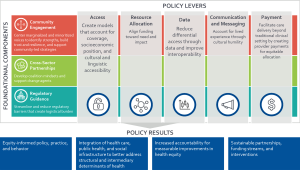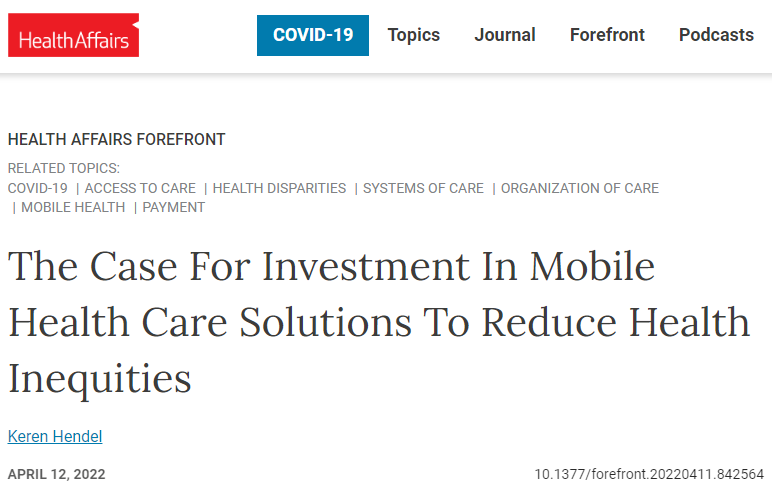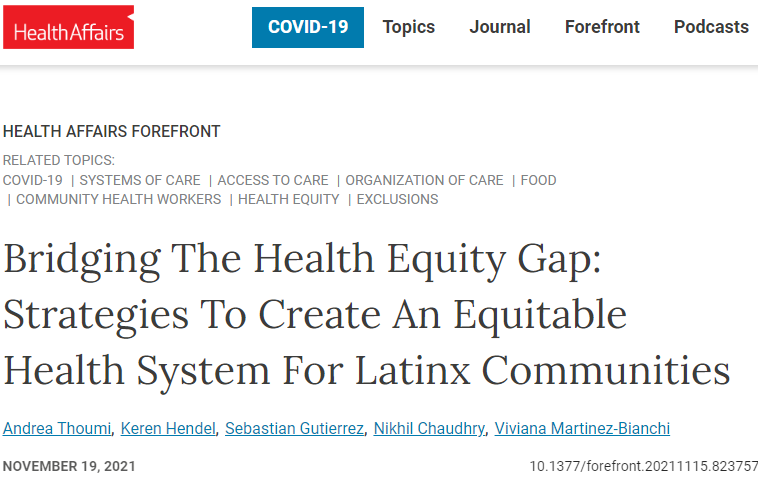Community Engagement in COVID-19 Policy Responses
The COVID-19 pandemic has magnified how structural racism and other structural determinants of health affect the lived experience of the public health emergency on historically marginalized populations. Achieving an equitable response to COVID-19 and future public health emergencies requires: reducing barriers that preclude populations from reaching health services in a timely manner, centering equity in policy making decisions, and engaging communities.
We have partnered with the Rapid Acceleration of Diagnostics - Underserved Populations, the Latinx Advocacy Team & Interdisciplinary Network for COVID-19 (LATIN-19), and other stakeholders to make COVID-19 testing, vaccinations, and therapeutics more equitable.
See related projects:
- COVID-19 Health Equity Learning Network
- Supporting Equitable COVID-19 Vaccine Distribution, Access, and Uptake
- COVID Testing
Funding and support for this work has generously been provided by the National Institutes of Health, Bass Connections at Duke University, and the Duke-Margolis Center.

Redressing Systemic Inequities: Five Lessons For Community-Based COVID-19 Testing From The RADx-UP Initiative
Andrea Thoumi, Kamaria Kaalund, Ethan Phillips, Gretchen Mason, Gabrielle Harris Walker, Gabriel Carrillo, Michael Cohen-Wolkowiez, Warren Kibbe, Giselle Corbie, Health Affairs Forefront, May 2022
Systemic barriers will continue to be foundational in inequalities that we can anticipate in care for communities experiencing the greatest impact by subsequent COVID-19 waves, limited access to test-to-treat models, and post-acute COVID-19 syndromes. Community-based COVID-19 testing models offer a solution to redress historical and contemporary experiences of systemic exclusion and structural racism that contribute to adverse health outcomes. In this article, we highlight lessons from the RADx-UP Initiative to illustrate how equity-focused strategies can expand testing uptake today and in the future. These lessons provide a framework and important policy directions for scaling up community-based approaches.

Scaling Up Equitable Access to Community-Based COVID-19 Testing: Strategies from the RADx-UP Initiative
Andrea Thoumi, Kamaria Kaalund, Sarah Bond, Gretchen Mason, Ethan Phillips, Gabrielle Harris Walker, Gabriel Carrillo, Kelly Keefe, Michael Cohen-Wolkowiez, Warren Kibbe, Giselle Corbie, May 2022
Insights from the Rapid Acceleration of Diagnostics-Underserved Populations (RADx-UP) Initiative offers a timely perspective into strategies for supporting community-based testing to respond to COVID-19 surges and variants. In this policy paper, we propose a policy framework to identify common barriers to equitable COVID-19 testing and facilitate the scaling-up of the solutions that emerged to address them. We identify five key policy levers and three foundational components that are necessary to lead to measurable improvements in health equity. We aim for health leaders—including policymakers, community organizers, and other health care practitioners—to use these community-engaged policy strategies to inform community-based testing for future COVID-19 surges and variants.
Please visit the RADx-UP health equity policy landing page to access a community brief that summarizes our policy paper for community partners in English and in Spanish.

The Case For Investment In Mobile Health Care Solutions To Reduce Health Inequities
Keren Hendel, Health Affairs Forefront, November 2021
This article won the AcademyHealth Disparities Interest Group’s student essay contest. Students were asked to write an editorial on any health disparities topic of their choice, with a focus on the specific causes or consequences of disparities and/or solutions with the most potential to reduce disparities. The article was edited by Health Affairs Forefront in conjunction with the author.

Bridging The Health Equity Gap: Strategies To Create An Equitable Health System For Latinx Communities
Andrea Thoumi, Keren Hendel, Sebastian Gutierrez, Nikhil Chaudhry, Viviana Martinez-Bianchi, Health Affairs Forefront, November 2021
The experience of health systems providing COVID-19 testing and vaccinations in partnership with community organizations elucidated equity gaps in care delivery. We describe three key strategies for creating policies that embed health equity principles in their design and implementation to move us closer to an equitable health care system.
Duke-Margolis Team

Nikhil Chaudhry, BA/BS '24
2021 Margolis Intern
Margolis Scholar

